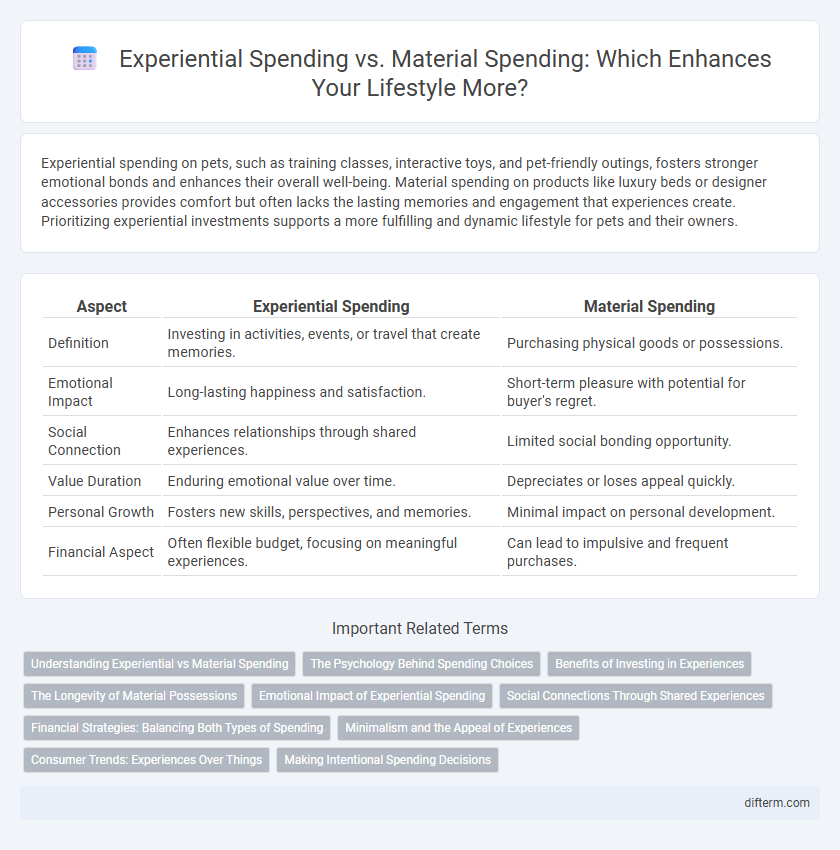Experiential spending on pets, such as training classes, interactive toys, and pet-friendly outings, fosters stronger emotional bonds and enhances their overall well-being. Material spending on products like luxury beds or designer accessories provides comfort but often lacks the lasting memories and engagement that experiences create. Prioritizing experiential investments supports a more fulfilling and dynamic lifestyle for pets and their owners.
Table of Comparison
| Aspect | Experiential Spending | Material Spending |
|---|---|---|
| Definition | Investing in activities, events, or travel that create memories. | Purchasing physical goods or possessions. |
| Emotional Impact | Long-lasting happiness and satisfaction. | Short-term pleasure with potential for buyer's regret. |
| Social Connection | Enhances relationships through shared experiences. | Limited social bonding opportunity. |
| Value Duration | Enduring emotional value over time. | Depreciates or loses appeal quickly. |
| Personal Growth | Fosters new skills, perspectives, and memories. | Minimal impact on personal development. |
| Financial Aspect | Often flexible budget, focusing on meaningful experiences. | Can lead to impulsive and frequent purchases. |
Understanding Experiential vs Material Spending
Experiential spending involves investing in activities, travel, or events that create lasting memories and emotional satisfaction, while material spending focuses on purchasing physical goods that provide temporary pleasure. Studies reveal that experiential purchases contribute more to long-term happiness due to their ability to enhance social connections and personal identity. Understanding the psychological benefits of experiential spending can help individuals prioritize meaningful life experiences over accumulating possessions.
The Psychology Behind Spending Choices
Experiential spending often leads to greater and longer-lasting happiness compared to material purchases because it satisfies intrinsic psychological needs such as social connection and personal growth. Neuroscientific research reveals that experiences activate brain regions associated with memory and emotion, making them more meaningful over time. Material spending, in contrast, tends to provide short-term gratification but diminishes quickly due to hedonic adaptation and comparison.
Benefits of Investing in Experiences
Investing in experiences enhances emotional well-being by creating lasting memories and stronger social bonds, offering greater long-term satisfaction than material purchases. Experiential spending often promotes personal growth and mindfulness, enriching life through diverse cultural, educational, and recreational activities. Studies consistently show that people derive more happiness from shared experiences than from acquiring physical goods, making experiential investment a meaningful lifestyle choice.
The Longevity of Material Possessions
Material possessions often provide temporary satisfaction, but experiential spending creates lasting memories that contribute to long-term happiness. Studies show that experiences enhance social bonds and personal growth, leading to greater life satisfaction over time. The longevity of material possessions rarely matches the enduring emotional benefits derived from meaningful experiences.
Emotional Impact of Experiential Spending
Experiential spending creates lasting emotional memories by fostering social connections and personal growth, which material purchases often fail to provide. Research indicates that experiences contribute significantly more to long-term happiness compared to acquiring physical goods. This emotional impact enhances overall well-being and satisfaction, driving a positive lifestyle shift toward prioritizing experiences over possessions.
Social Connections Through Shared Experiences
Experiential spending, such as attending concerts or traveling with friends, fosters deeper social connections compared to material purchases by creating lasting memories and shared stories. Research indicates that experiences boost happiness and strengthen relationships more effectively than acquiring physical goods. Prioritizing experiential investments enhances social well-being and cultivates a sense of belonging.
Financial Strategies: Balancing Both Types of Spending
Effective financial strategies integrate experiential spending and material purchases to achieve a balanced lifestyle. Prioritizing experiences such as travel or cultural events enhances wellbeing and creates lasting memories, while mindful material spending on quality items supports long-term satisfaction. Allocating budgets based on personal values ensures sustainable wealth management and maximizes overall happiness.
Minimalism and the Appeal of Experiences
Experiential spending fosters lasting memories and personal growth, often leading to greater life satisfaction compared to material spending, which offers temporary gratification. Minimalism emphasizes the value of intentional living by prioritizing meaningful experiences over accumulating possessions. Research shows that investing in travel, social activities, and learning opportunities enhances well-being and reduces stress, reinforcing the appeal of experience-based consumption.
Consumer Trends: Experiences Over Things
Consumer trends increasingly favor experiential spending over material purchases, reflecting a shift toward valuing memories and personal growth. Research shows that experiences such as travel, concerts, and dining out generate longer-lasting happiness compared to owning physical goods. This shift aligns with millennials and Gen Z prioritizing meaningful activities and social connections over accumulating possessions.
Making Intentional Spending Decisions
Intentional spending prioritizes experiential purchases that create lasting memories and enhance well-being over material acquisitions with short-lived satisfaction. Research shows that experiences contribute more to long-term happiness by fostering social connections and personal growth. Budgeting for activities like travel, concerts, or dining with loved ones supports a lifestyle centered on meaningful moments rather than accumulating possessions.
experiential spending vs material spending Infographic

 difterm.com
difterm.com